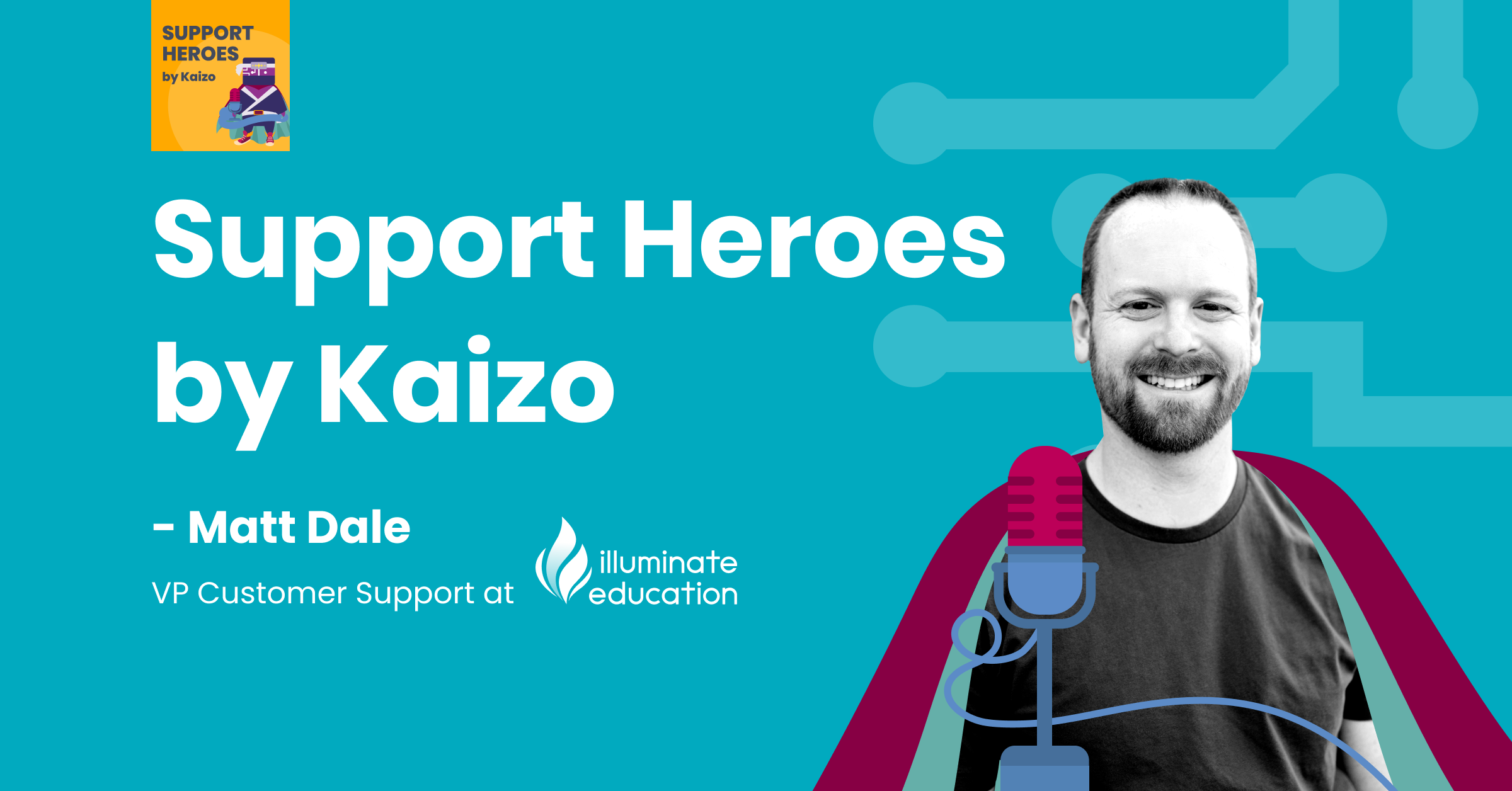Click ‘subscribe’ above to listen or download from Apple Podcast, Spotify, Google Podcast, and Amazon Music.
The thirteenth release of Support Heroes by Kaizo featured Matt dale- VP of Customer Support at Illuminate Education.
In this episode, Matt outlines the evolution of the processes that allow his department to service 12 separate products simultaneously. We see how Matt has focused on keeping his department active and finding new ways to apply agents’ skills during down season. Finally, we touch on how Matt’s number 2’s grew from agents to directors and how their career path can be replicated.
Key Highlights
1. Dealing with extreme seasonality combined with a steep agent skill curve
2. Staying productive in months of low volume
3. Developing a career within the support department
Dealing with extreme seasonality combined with a steep agent skill curve
“Generally we see about 45% of our volume from mid-August to late November. That’s our busy season and we see volume in a lot of products double during that period of time.”
“In June-July, when school is out, we get very little volume. We suddenly go from that to whiplash speeds”
The thing that makes this extreme seasonality more difficult for Matt’s team is the steep learning curve involved with supporting their products.
Unlike an industry like ecommerce, Matt can’t hire agents on short term contracts to deal with the seasonal volume. Too much training is required before they can effectively contribute…
“During the onboarding process we say to [the new agents], ‘It’s going to take you 6 months to be useful and we’re really okay with that. You need to be okay with that…We’ve all been there’”
Due to this steep learning curve, agents at Illuminate Education focus on supporting a primary product.
Recently, however, Matt and the team instigated a cross training programme to allow agents to shift between products when more bodies are required for a particular service. Making the department more flexible overall.
“Some of our products are earlier in the cycle whereas some products pick up later. Shuffling things around let’s us be balanced, and if needed, we pull in the CSM team, sales or developers to partner with us and help us”
Staying productive in months of low volume
“Our off seasons are spent preparing for the next busy season.”
“The first job our team has is figuring out how we set ourselves up for success this year based on what we learned last year.”
One such task was setting up the aforementioned cross training programme. Doing so was part of a greater trend of taking the off-season to constantly improve processes.
“[During this time] our fundamental is- how do we work on the business, rather than doing the work of the business or working in the business”
The second major strategy is loaning out support staff to other departments when they’re not required on the frontline due to reduced volume.
“We’ve had [agents] move successfully to the CSM team in the short term…a move to QA works well for the technical folks…we’ve also had people help with finance…technical sales support…”
“There’s a lot of different parts of the business that people with a support background can move into and be very successful”
Support staff being loaned to other departments or graduating to other roles in the business has positive consequences for Illuminate Education and their customers.
“Making the whole company more support minded has been a really great unintended consequence of [support staff] graduating into other roles. It has helped us be a better company.”
Developing a career within the support department
“The mindset it takes to be a good support agent is very different from the mindset it takes to be a good manager”
“Making that transition from being queue minded to more company minded- [asking] what do we need to do for the bigger picture of the business is one that can be challenging for a lot of folks”
Being an agent, one learns about what customers want and how to satisfy their needs. Being a manager in a support setting entails remembering this within a greater scheme of needs and priorities…
“Having a big picture understanding of what customers’ needs are, making sure urgent issued aren’t getting ignored, handling what the team needs and what each person needs to be successful, and making sure everything’s running smoothly”
…are all things managers have to balance on top of managing the queue.
Two individuals that successfully made that transition were Kaylin Bailey and Kallen Bakas- who both joined Illuminate Education as agents and are now directors reporting directly to Matt as his number twos.
“Kallen Bakas started off as the first support agent and as that team grew, we suddenly needed a team lead and he was the obvious choice.”
“He’d been there the longest and had good experience helping the remote team feel connected”
“Kaylin Bailey came as a frontline agent with experience of different support techniques from GoFundMe. She was really good at interacting with people”
“Although at the time she was a frontline agent, we started doing the hiring together after she’s been with us a year. After a couple of interviews, it was clear she knew people and could get to the heart of an issue”


